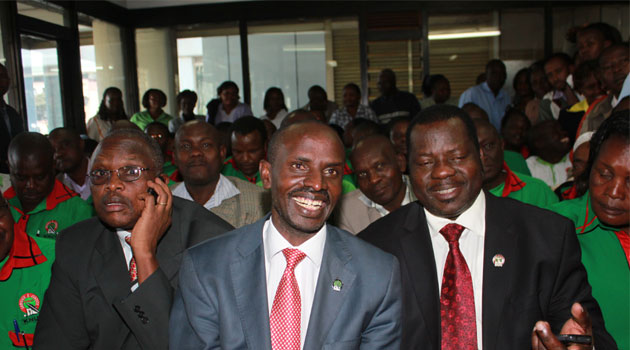
KNUT through its lawyer Paul Muite refuted TSC’s claim that the Industrial court lacked jurisdiction to act as a mediator and contended that it was within its mandate to do so/FILE
KNUT through its lawyer Paul Muite refuted TSC’s claim that the Industrial court lacked jurisdiction to act as a mediator and contended that it was within its mandate to do so.
Muite further argued that the only body with the capacity to determine and review teachers’ salaries was the TSC and not the Salaries and Remuneration Commission.
“Any suggestion that this court lacks jurisdiction is not founded on a legal position. We have tried every form of negotiation but that has proved futile and that is the reason we came before this court so that a determination may be made,”
The lawyer further emphasised that teachers are not State officers and as such the SRC had no mandate to conduct a job evaluation of the tutors.
“Teachers are not State officers so that means in terms of section 230 of the Constitution, SRC has no mandate to fix the remunerations of teachers. As a result, teachers want their salaries to be negotiated between their unions and the TSC. It is the TSC’s role to set the terms of service of teachers and employ them,” he stated.
He accused TSC of allowing itself to be completely overrun by the government and the SRC.
“TSC has allowed itself to be completely pushed back by the SRC and the government. It should have been able to negotiate for an adequate budget to fully cater for the teachers Collective Bargaining Agreement from 2012 to 2017 and then another one from 2017 onwards. It is only by doing this that we can fully resolve this issue of strikes which has become a daily occurrence,” he stated.
The court took up the arbitration role after TSC and the two teachers’ unions failed to agree on new pay demands that triggered a nationwide strike early this year.
The unions maintained that an increase in basic pay was mandatory to calling off the strike, but TSC disowned the offer.
In its petition, TSC had claimed that the court was infringing on the duties of the commission and that of the SRC which are the only bodies mandated to determine salaries and pay structures of teachers.
The judge had stressed the need for a lasting solution to curtail the spate of industrial strikes that has marred the teaching profession for many years.
Following the orders by the court, the two unions hit out at TSC over its petition saying that it was done in bad faith and if successful, would worsen the situation.
The last negotiated increment on basic pay enjoyed by teachers dates back to 1997, pursuant to Legal Notice No.534 of 1997, which was implemented over a span of 10 years, ending in 2007. However there have been arbitrary non-negotiated increments in the name of harmonization of teachers’ salaries with those of civil servants.
Presently, P1 teachers earn a minimum of Sh16,692 and a maximum of Sh24,304 but the unions propose that the same teachers should earn a basic salary of not less than Sh58,863 with the maximum pegged at Sh68,355.
In a document presented by the aggrieved parties, the unions justified their demands of the increase in basic salary by acknowledging its importance in borrowing and calculation of pension and terminal benefits and in determining one’s earning capacity.














































